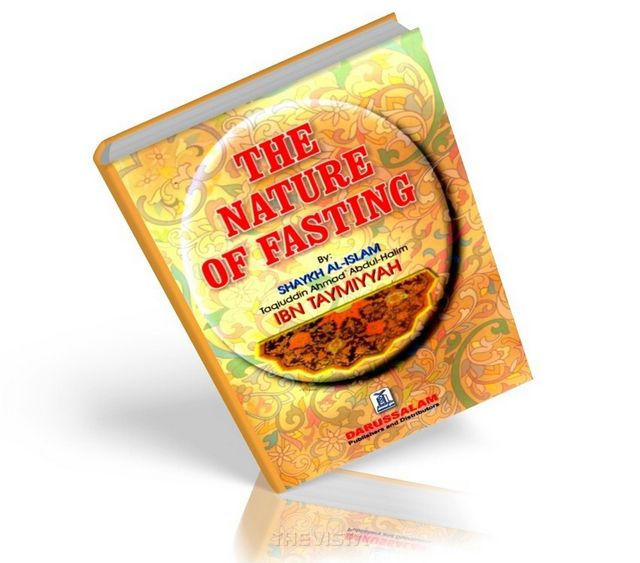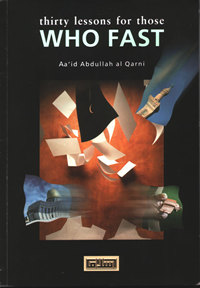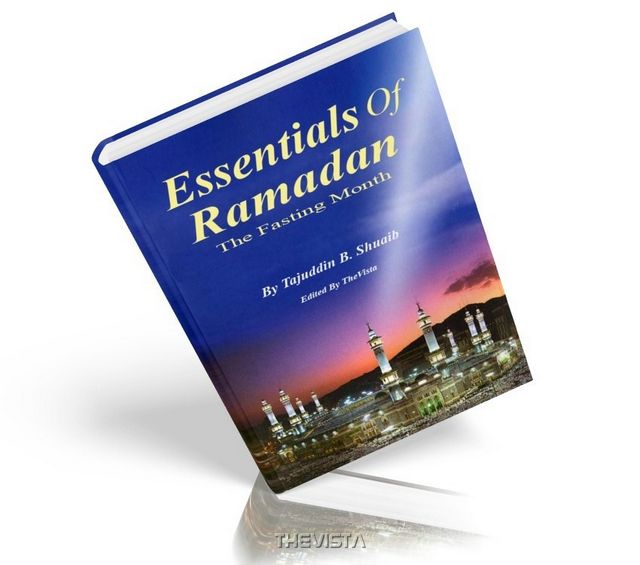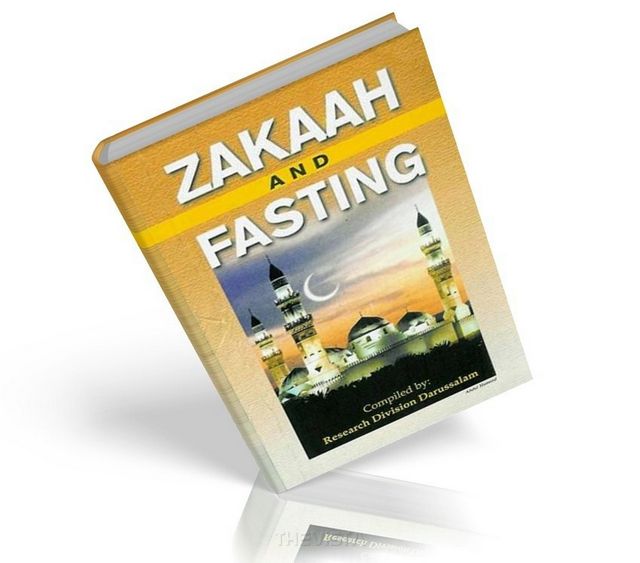|
|
WorldOfIslam.info | Islamic Ebooks about Fasting, download your ebooks for free
New Page 1
|
/
(10)
/ (1) /
(17)
/
(31)
/ (4) /
(3) /
(3)
/ (2) /
(15) /
(5) /
(8)
/ (3)
/ (18) / (2)
/ (2)
/ (8)
/ (1) /
(13)
/ (10)
/ (13)
/ (3)
/ (7)
/ (2)
/ (2)
/ (4)
/ (3)
/ (39) / (3)
/ (7)
/ (1)
/ (8)
/ (2) /
(3) /
(5) /
(6) /
(13) /
(7) /
(8) /
(8) /
(2) /
(51) /
(15) /
(4) |
|
The Night Prayer in Ramadaan

The Night Prayer in
Ramadaan
By Imaam Muhammad Naasir-ud-Deen Al-Albaanee
(Died 1420H)
Complete with Arabic text for all narrations
About the Book:
Before you is a complete translation of the book
�Qiyaamu Ramadaan� (The Night Prayer in Ramadaan)
written by Imaam Muhammad Naasir-ud-Deen Al-Albaanee.
This treatise is in
essence an abridged version of one of Al-Albaanee�s
other books, Salaat-ut-Taraaweeh, along with several
additional points of benefit and a section on
�Itikaaf. The book�s introduction also consists of a
counter-refutation against those who replied to Al-Albaanee�s
afore-mentioned book on Taraaweeh.
The main core of
the book, however, contains a point-by-point
discussion on the Night Prayer in Ramadaan, as well
as the benefits and rulings of �Itikaaf, along with
their evidences. The Arabic text for all ayaat and
ahaadeeth have also been included in this edition so
as to increase the benefit for those readers who
wish to memorize the proofs.
Important Note:
This book contains the Arabic text for all of its
narrations so as to make it an easy to study
reference-guide.
About the Author:
Imaam Al-Albaanee was one if not the greatest
scholars at the head of this century. Although he
passed away in 1419, he left behind him a legacy of
Islamic awareness and a mountain of knowledge in the
form of books, lectures, verifications and scholarly
research. This particular book is one of his smaller
well-known works, may Allaah have mercy on him
|
|
Matters Related to Fasting

Allah has blessed His slaves with certain seasons of
goodness, in which hasanat (rewards for good deeds)
are multiplied, sayyi�at (bad deeds) are forgiven,
people�s status is raised and the hearts of the
believers turn to their Lord. Those who purify
themselves attain success and those who corrupt
themselves fail.
One of the greatest acts of
worship is fasting, which Allah has made obligatory
to his slaves.
As the status of this act of worship is so high, it
is essential to learn the Ahkam (rulings) that have
to do with the month of fasting, so that the Muslim
will know what is obligatory, in order to do it,
what is haram, in order to avoid it, and what is
permissible, so that he does not need to subject
himself to hardship by depriving himself of it.
This book is a good summary of
the rulings, etiquettes, and Sunnah of fasting.
|
The Islamic Month (The Month Of Ramadhan)
.jpg)
Taqi Usmani | Language:
English | Format: PDF | Pages: 36 | Size: 4 MB
�The
ninth month of the Islamic calender is called
�Ramadhan� and it is the most meritorious month of
the whole year. Since there are many specific rules
peculoar to this monht, we would like to deal with
its characteristics in a rather detailed manner
under different sections. The Holy Qur�an has
expressly told us that the basic objective for which
man is created is that he �worships� Him: �And I did
not create Jinn & Humans beings except that they
should worship me� The word used by the Holy Qur�an
for worship is �Ibadah� which has a much wider sense
than �worship.� In the
English, word �worship� normally indicates to some
specific acts or rituals meant exclusively to show
one�s reverence to his Creator. But the word
�Ibadhah� is not restricted to such acts or rituals
rather, it emboides any act done in submission to
Allah�s command and to seek His pleasures.
Therefore, many acts which seem to be mundane in
nature are included in the word �Ibadhah� like
earning one�s livelihood through Halal (permissible)
means and in order to fulfill one�s obliagtion
towards his dependants.�
|
|
Repentance In Ramadhan

Ibraaheem ibn Hamad al-Mansoor | Language:
English | Format: PDF | Pages: 06 | Size: 1 MB
This book is a consise work on the importance of repentance during the
holy month of Ramadhan. It is an invigorating short book that
insh�Allah will provoke an emotive response and inspire the reader to
take advantage of the blessings Allah has permitted us�
In the words of the author, this book was written �for everyone who
wants to change his situation and his actions so as to earn the pleasure
of his Creator and achieve happiness in this world and in the
Hereafter�.
|
The Nature of Fasting

Shaykh al-Islam
Ibn Taymiyyah | Language: English | Format: PDF | Pages: 46 | Size: 2 MB
This is a translation one of the smaller publications from the words of
Shaykh Al-Islam Taqiuddin Ahmad bin �Abdul-Halim Ibn Taymiyyah. It has
been published in this form a variety of times with a number of minor
additions to the text under the title, �Haqiqatus- Siyam,� or �The
Nature of Fasting.� This book will help the reader better understand the
fine points about fasting. What is the nature of the things that break
the fast? What are the rules by which one can know the difference
between what breaks the fast and what does not? These question are more
answered by Shaykh Al-Islam Ibn Taymiyyah in his discussion of the
Nature of Fasting.
Table of Contents
THE NATURE OF THINGS THAT
BREAK THE FAST
THE NATURE OF THINGS THAT DO NOT BREAK THE FAST
Questions and Answers
Fasting the Cloudy Day and the Day of Doubt
Fasting and Shortening the Prayer for the Traveler
Fasting for the Traveler: Better or Worse?
Must One Intend to Fast the Night Before?
Is the Intention Necessary Every Day?
How Fast is the Fast to be Broken?
Eating After the Earlier Adhan
If Fasting Causes Fainting and Madness
The Case of A Pregnant Woman
Publishers Note
All praise is due to Allah, and may He grant peace
and blessings upon His Last Messenger Muhammad.
This is a translation one of the smaller
publications from the works of Shaykh Al-Islam Taqiuddin Ahmad bin
�Abdul-Halim Ibn Taymiyyah. It has been published in this form a variety
of times with a number of minor additions to the text under the title, �Hagigatus-Siyam,�
or, �The Nature of Fasting.� We have revised our version to meet the
source section of Majmu� AI-Fatawa (25:219) from where it appears that
the original booklet - with the exception of the questions, of which
most appear on earlier pages - has been taken. We have inserted brackets
to signify the additions, which earlier publishers probably took from
other sections of his writings. We have also added brief references to
the text for the Hadiths. I would like to express gratitude to brother
Ebrahim Aly Ma�rouf for the original translation of this booklet, and
the Darussalam staff for their editing and layout work.
In the end all praise is due to Allah, and upon Him
we depend.
Abdul-Malik Mujahid, General Manager, Darussalam
|
30 Lessons For Those Who Fast

By Aa�id Abdullah al Qarni.
In relation to fasting, this book contains the most pertinent Qur�anic
verses, authentic ahadeeth, delightful poetry and touching advice. It is
therefore, a book for the righteous when they meet for pleasant
conversations.
It is also a gift for
wayfarers when they break their journeys for rest, a treasure for those
who share mutual love and respect - For Ramadhan is indeed the noblest
month and its days are the sweetest days�
|
Essentials Of Ramadan

Tajuddin B. Shuaib
| Language: English | Format: PDF | Pages: 225 | Size: 2 MB
Essentials Of Ramadan: This is an in-depth resume of the
essential rules and laws on the Fiqh of fasting designed to provide the
reader with explanation for both spiritual and physical significance and
uniqueness of this remarkable act of worship. Sheikh Shu`aib clarifies
major point on fasting. His focus is relevance of this divine discipline
on to the life and living as well as the interpretation of related text
on Fasting based on Al-Qur`an and the Sunnah of the Messenger of Allah (PBUH).
This book serves as a guide and reference on courses on Islamic studies.
Short
Introduction:
Whenever the orbit turns
and another month of Ramadan approaches, happiness and joy return to the
Ummah (Nation), for with it come two of the greatest gifts of Allah,
namely the fasting month of Ramadan and the celebration of the
revelation of Al Qur�an.
Fasting is an eloquent
expression of Allah, leading this Ummah to fates of His mercy, a key
unlocking the mysteries of his nearness. While humanity is divided on
the basic elements of the notion of the Creator, a Muslim is far ahead
of the rest of the world in this field and travelling at the speed of
the light to the neighborhood of the Throne of the Creator, Where else
would you find a discipline that provides direct communication between
the servant the served? Where else would you have an act of �Ebadah
(Worship) that enriches self-worth, self-strength, self-rebuilding, self
discipline and control? Where else would one find discipline that moves
the believer from unauthentic to authentic as the institution of
fasting? Where else would you find a discipline that enriches the vital
needs of human being, both physical and spiritual? Praise be to Allah!
The institution of Fasting
is a unique form of worship prescribed as part of an overall system of
Islam. Its uniqueness mirrors the uniqueness of the human being, a
creature of physical and spiritual parts whose excellence depends on the
right proportion of these two parts. Too much of the physical material
will ruin man, and too much of the spiritual will too fasting orients
the observer to the art of balancing the spiritual essentials with
physical needs, a vivid proof that there is in all of us the will power,
a pivotal element that controls our actions. This will be needed to help
up curb the animalistic tendencies originating from the stomach, in
full; it makes us forget about beginning, it awakens the mind and
kindles clear thinking and consciousness of Allah. Fasting is the
sobering of a mind and reconstruction of our spiritual faculties.
|
Zakaah And Fasting

Research Division
Darussalam | Language: English | Format: PDF | Pages: 20 | Size: 1 MB
Zakat is a certain fixed portion of the wealth and property that a
Muslim is obliged to pay yearly for the benefit of the poor in the
Muslim community. The payment of Zakat is obligatory, as it is one of
the five pillars of Islam. Zakat is the major economic means for
establishing social justice and leading the Muslim society towards
prosperity and security. Every Muslim who owns a fixed, minimum amount
of wealth (called Nisab), and who satisfies certain other conditions,
must pay Zakat. The Qur�an mentions Zakat in many places. For example,
Allah (S.W.T) says: �Take Sadaqah (obligatory charity) from their wealth
in order to purify them and sanctify them with it, and invoke Allah for
them. Verily, your invocations are a source of security for them, and
Allah is All-Hearer, All-Knower.� (9:103)
In the Name of Allah,
the Most Gracious, the Most Merciful.
All the praises and thanks are due to Allah (S.W.T),
the peace and blessings of Allah (S.W.T) be upon Prophet Muhammad,
his Household, and all of his Companions.
Publisher�s Note
In the Name of Allah, the Most Gracious, the Most Merciful. This series
of seven books entitled �Lessons for New Muslims,� includes he titles:
The Muslim Creed Expounded; Prayer and Purification; Zakah and Fasting;
Easy �Umrah and Hajj; Basic Muslim Morals and Manners; some selected
supplications From the Qur�an; and the Noble Qur�an (part 30). The
material for these books was compiled and edited by Sidheeque M.A.
Veliankode, Aqeel Nalker, Abu Hamza Al-Arabi, and Abu Khaliyl. Our main
objective was only to include information for someone who has recently
accepted Islam as their new way of life. This series is accompanied by a
cassette with complete instructions about ritual purity and prayer (Salah),
featuring Dr. Ahmad Saifuddeen, associate professor at Imam Muhammad bin
Saud Islamic University of Riyadh. We would like to thank all those
involved in the preparation of this series.
General Director
Abdul Malik Mujahid
Darussalam
|
| |




.jpg)




